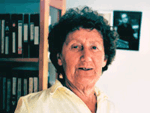Miklòs Gimes presents a fascinating, sincere, provocative, but oddly sterile portrait of his parents’ political activism and personal relationship during the turbulent and uncertain landscape of postwar Hungary in Mütter. The film opens with the 1989 national broadcast of Hungary’s official burial ceremony at the Budapest Heroes Square that included the filmmaker’s father, journalist and resistance fighter Miklòs Gimes who was executed in 1958 under charges of treason for his role in the failed 1956 Hungarian uprising that opposed the country’s increasing alliance with the Soviet Union and entry into the Soviet bloc. Filming the life of Gimes’ widow Alice, affectionately called Lucy, as she alternately resides between her adopted home in Zurich (after fleeing Hungary with family relatives in 1956 following the Russian invasion) and Budapest, the film interweaves biographical information, personal interviews, and archived material to create a complex portrait of the passionate, independent-minded, and pragmatic woman still struggling to reconcile with her new public role as an “official widow”, having experienced her husband’s death at a time when the dissolution of their marriage due to his infidelity seemed inevitable. What is revealed is a poignant and compelling portrait of an estranged and deeply divided soul unable to find closure in the haunted memories of her imperfect, but patriotic and dedicated husband’s nationally idealized legacy.
© Acquarello 2003. All rights reserved.
